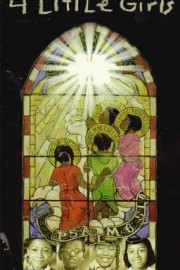4 Little Girls
When I watched “Selma” last month, I was profoundly affected by the fact that the first thing we see in the movie is the 1963 bombing of a Birmingham church that led to the death of four girls. A lot of people may not have been aware of that significant tragedy, but I did, and the big reason was because of my memories of watching “4 Little Girls,” Spike Lee’s 1997 documentary about the girls whose lives were taken that day. The film had a heartbreaking effect on me at the time, and now, it still packs a punch.
Denise McNair, Carole Robertson, Cynthia Wesley, and Addie Mae Collins. They were on their way to choir practice that Sunday morning, as they had many times before, when a bomb went off at the Bethel Baptist Church in Birmingham, killing the girls. It was an important moment in the continuing Civil Rights movement going on at the time, because it was such a devastating, senseless act of violence. These weren’t adults, but children, just hitting their teenage years. We watch as friends, neighbors and family members remember the girls, and we are moved by their emotions and stories. We get a picture of what the temper of the times was in Birmingham, hearing it called one of the most resistant places to integration in the country, and even without considering the bombing that is the subject of Lee’s film, it’s impossible not to agree with that.
The voices of the people on camera have a combination of nostalgia, sadness, rage and optimism in them that is only possible for people who have lived through great trials, great personal loss, yet still came out whole on the other side to accomplish great things. Many of these people lost someone deeply important to them on that Sunday in 1963, and yet, their voices aren’t bitter or scornful. Instead, they speak with eloquence and poetry and a love that would never dissipate. We see pictures of the girls, both when they were alive, and shockingly, after they died. The latter is important, because we should never forget the price some have paid for the racism and ignorance that has stained our nation’s soul for far too long. Unfortunately, too many think that because of the successes of the Civil Rights movement, racism and prejudice is over, but if the past few years has shown us anything, it’s that nothing could be further from the truth. We need to be reminded of this past, lest we forget, and are doomed to repeat it. We still have a ways to go.
This was Spike Lee’s first feature length documentary effort, and it is a masterpiece. How Lee, whose passions on intolerance and hatred run through with fire, managed to maintain the objectivity necessary to make “4 Little Girls” into a clear-eyed view of a tragedy is beyond me. The control of his craft, that same control that is evident in his best narrative films (“Do the Right Thing,” “Malcolm X,” “Get on the Bus”), is stunning, especially when you see him interview former Alabama governor George Wallace, who famously said, “Segregation now, segregation tomorrow, segregation forever,” but in his later years, changed his views. Still, Wallace’s endorsement of segregation is part of what led to these four lives being snuffed out, and both Wallace and Lee no doubt know it. It’s a remarkable moment in a film full of them. We watch the film, and are saddened of the reasons it exists, but deeply moved by what it shows us about the heart’s ability to heal, and remember the good times over the bad. That is one of Lee’s strengths as a filmmaker, and it’s an important part to “4 Little Girls’s” overall impact. It stays with you.










